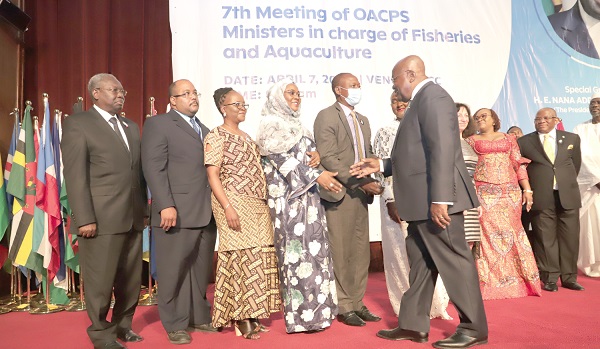
Collaborate to restore productivity of marine life - President to ACP states
President Nana Addo Dankwa Akufo-Addo has called on member states of the Organisation of African, Caribbean and Pacific States (OACPS) to work in concert to reverse the decline and restore the productivity and resilience of oceans and marine ecosystems.
He said “we have no other option” than to adopt measures to attain conservation and the sustainable use of the oceans for present and future generations.
Advertisement
President Akufo-Addo made the call when he opened the 7th meeting of the OACPS Ministers in charge of Fisheries and Aquaculture in Accra on April 7, 2022.
The meeting, which is also being attended by leading fisheries professionals and practitioners, is on the theme: “OACPS’s Blue Economy Agenda 2030 – Catalysing Sustainable Fisheries and Aquaculture Development for the Future.”
Objectives
The objectives of the meeting include reinforcing high-level, broad-based shared commitment and support of OACPS priorities for the sustainable development and growth of its fisheries and aquaculture; taking stock of the achievements and challenges of implementation of the Strategic Plan of Action for Fisheries and Aquaculture 2012-20 and defining specific policy and strategic interventions to address sectoral challenges under the proposed draft Strategic Plan of Action tabled for the meeting’s consideration.
It also seeks to provide a forum to deepen cooperation and identify areas for strategic engagement with partners in ocean governance, blue economy, fisheries and aquaculture development for the benefit of members of the OACPS.
Inclusion
President Akufo-Addo explained that Ghana supported the inclusion of all relevant stakeholders, including governments, intergovernmental organisations, financial institutions, civil society organisations and scientific communities, in finding solutions and tackling collectively essential problems related to the oceans.
“Increasing scientific knowledge and developing research capability and transfer of marine technology will be crucial,” he added.
National Plan
He noted that Ghana was implementing a national plan of action to help curb the menace of illegal, unregulated and unreported (IUU) fishing activities.
The plan of action, he explained, included fish catch certification, reactivation and installation of vessel monitoring systems, automatic identification systems of vessels and ports and beaches inspection.
He added that Ghana, together with Togo and Benin, had signed on to implement a joint Fisheries Observer Programme as part of efforts to ensure safe, secure and legal fisheries operations across the Gulf of Guinea at all times.
The President said work was almost completed on the ocean governance study, and that the requisite structures and processes were being put in place to ensure that the rest of the West African partners completed their sustainable ocean plan by 2025, as prescribed by the high-level panel on the ocean economy on December 20, 2021.
Furthermore, he indicated that at the continental level, Ghana was in the process of ratifying the Cape Town 2012 agreement on fishing vessel safety.
It was expected that Ghana would shortly deposit its instrument, a move which, he said, would mark a major milestone in the country’s endeavour to build a sustainable blue economy.
Plastic pollution
The President indicated that Ghana shared in the vision of the new plastics economy and would sign on to the initiative.
“One other matter that poses even greater existential threat to our oceans is climate change and its impact on our oceans, the gradual warming of our oceans and increasing acidification and their effects on the marine environment and resources,” he said.
These, he noted, needed to be addressed through the implementation of the Paris Agreement on Climate Change.
Sustainable management
The Minister of Fisheries and Aquaculture Development, Mavis Hawa Koomson, said the world was faced with challenges with the sustainable management of fisheries resources and the development of aquaculture.
The challenges, she explained, included climate change, ocean pollution, low investment in aquaculture and unsustainable practices such as IUU fishing.
She noted that marine and ecosystems degradation, ocean pollution and the impact of climate change were not impacting only on fisheries but also other key sectors, such as tourism and transportation.
Human induced pressures
The Secretary-General of the OACPS, Georges Rebelo Pinto Chikoti, said the meeting was taking place at a time when sustainable management and conservation of the ocean faced challenges due to human-induced pressures.
He mentioned the pressures to include overfishing, environmental degradation, climate change and the COVID-19 pandemic.




